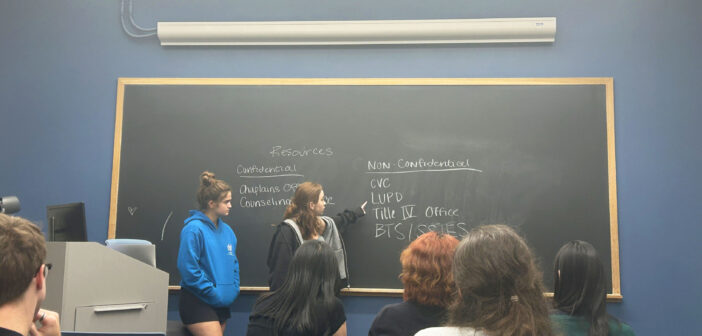Yeardley Love, a senior from the University of Virginia, was tragically killed in her college apartment by her former boyfriend in May 2010.
Her mom, Sharon Love, said the idea of her daughter getting hurt by her partner had never crossed her mind before the incident.
“I didn’t know then what I know now, that relationship abuse is a public health epidemic and that young women in Yeardley’s age group are at three times greater risk than any other demographic,” she wrote on the foundation’s website.
According to the foundation, Yeardley’s family turned their devastation into the One Love Foundation which works to “educate young people about the difference between healthy and unhealthy relationships so that they may seek help before an abusive relationship escalates to violence.”
Brooke DeSipio, assistant dean and director of survivor support and intimacy education at Lehigh, said intimate partner abuse is statistically high for the 18 to 24 year old age group.
While 43% of college women who are dating report experiencing violence and abusive dating behaviors, 58% of college students say they don’t know what to do to help someone who is a victim of domestic violence, according to the National Domestic Violence Hotline.
Today, One Love’s mission is prevalent on Lehigh’s campus through first-year orientation, athlete training, and sorority and fraternity educational sessions.
The foundation’s film “Behind the Post” was presented and discussed last Tuesday, Oct. 3, hosted by the Office of Survivor Support and Intimacy Education in collaboration with Break The Silence.
DeSipio said the film is one of two presented by the office. Lehigh has been implementing One Love’s free programming since its first introduction of the “Escalation” film in 2018.
“Behind the Post,” the shorter film of the two, specifically focuses on the 10 signs of an unhealthy relationship — intensity, possessiveness, manipulation, isolation, sabotage, belittling, guilting, volatility, deflecting responsibility and betrayal — in addition to the role social media plays in them.
According to the Hotline, 36% of college students who are dating have given a partner their computer, email or social media passwords, which makes these students more likely to experience digital dating abuse.
Digital dating abuse, depicted in the film, is a form of verbal and/or emotional abuse which can include unwanted, repeated calls or text messages, pressure to send private pictures, and the use of social networking sites to bully, harass or stalk a partner, according the Women’s Freedom Center.
“Things in real life can be very different than what is portrayed on social media,” DeSipio said. “So, you could not be seeing the unhealthy signs because folks are intentionally trying to post a depiction of a really great relationship that might not be real behavior-wise.”
The event is a 5×10 offered to first-year students, DeSipio said, but open to all of the campus community.
She said the programming is typically offered in October because of Domestic Violence Awareness Month, which usually is a common time first-years seek to complete their 5×10 requirements.
Motahareh Lotfaliani, the graduate assistant for the Office of Survivor Support and Intimacy Education, said “Behind the Post” is relevant to all students, but specifically first-years.
“I think for (first-years) it is really necessary because they are new here, they don’t know their environment very well,” Lotfaliani said. “They don’t know about the resources they can use. They will watch this video and be aware of their surroundings and the red signs, but also they can inform others and their friends too.”
In the past few years, DeSipio said the event averaged about 20 attendees. On Tuesday, 25 students of various class years were present.
Takeru Hiura, ‘27, came to the event because he felt he related to the topic. He said he is content the event is open to all class years because it is applicable to all ages.
“I feel like relationships definitely don’t depend on what grade or year you’re in,” Hiura said. “(It’s useful) for the future, so it’s a good way to learn and reflect on what is good and what’s bad.”
After the film, a conversation was led by BTS members Theo Mace, ‘26, and Jane White, ‘26, where students were prompted to identify the 10 red flags shown in the video and discuss why it is important to know what signs to look for in unhealthy relationships.
Sophia Fox, ‘26, recently transferred to Lehigh from Texas State University. She said while her previous school had similar resources but it was not as in-depth or visible as the One Love event.
She said was required to do an online course on the topic as a first-year student, but the conversation aspect is what she found the most useful.
“You’re still learning from the video and getting a lot of good information on how things work,” Fox said. “The conversation adds to that. If you can’t have the conversation, the video is good. It’s better than not having anything. But the conversation is really where you’re going to get a lot of the best information.”
DeSipio said the second film screening, “Escalation,” and workshop will be on Oct. 19 at 4:30 p.m.






Comment policy
Comments posted to The Brown and White website are reviewed by a moderator before being approved. Incendiary speech or harassing language, including comments targeted at individuals, may be deemed unacceptable and not published. Spam and other soliciting will also be declined.
The Brown and White also reserves the right to not publish entirely anonymous comments.
1 Comment
This is such an insightful article by our wonderful managing editor, Julia! It’s great to see that Lehigh has so many useful resources and makes an effort to bring awareness to its students. This article is another great way to bring awareness to the cause.